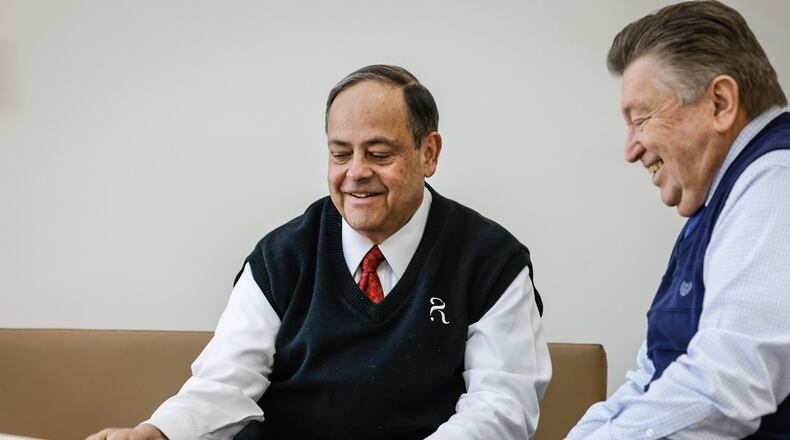The 73-year-old meets with his financial adviser quarterly both for peace of mind and to stay up to date with how the market is affecting his investments. Regular retirement checkups keep expectations realistic, said Gallas, who owns the Kettering-based Long Term Care Insurance Agency.
“You want to be able to have that reality check,” he said. “There’s a lot of turbulence in the market.”
Rafi Rodriguez, president of Rodriguez Financial Strategies LLC in Beavercreek, is his adviser and friend. Rodriguez recommends meeting with a specialized retirement income financial adviser annually beginning at least 10 years before retirement, with more frequent checkups as retirement draws nearer.
“You start training the mind about what’s really important,” he said.
Regular checkups mean there are no surprises. Portfolios that are reviewed multiple times per year are generally updated quarterly but at least annually, he said.
These checkups are also the time to review retirement income sources and verify that they are enough to take care of both wants and needs. With rising inflation, the cost of basic needs has increased over the years, he said.
In addition, emergency funds should be reviewed to ensure that they are able to cover an unexpected event like an accident. Beneficiaries, life insurance policies, long-term care protection and medical plans also should be reviewed.
Current events can play a large role from meeting to meeting. Inflation, interest rates, supply chain issues, world events and governmental policy changes all can impact a portfolio, Rodriguez said.
“There are so many things you have to be aware of,” he said.
The COVID-19 pandemic, high inflation and falling markets are affecting not only retirees who are living off their portfolios, but also workers who are thinking about retiring in the coming months and years, said Danny Gudorf, a financial planner and the owner of Gudorf Financial Group, which focuses on retirement and tax planning for people over the age of 50.
“A lot of people are rethinking that retirement decision,” he said.
A retirement assessment at age 50 or 55 can help clients see the big picture regarding their assets, including their investment accounts, retirement accounts, Social Security benefits, pension and real estate.
“You need to combine all of your potential resources together,” he said.
He recommends checkups at least twice each year – in April or May after tax season, and then again in September or October for end-of-year tax planning. Each meeting typically focusses on a specific topic, such as tax strategies, reviewing the client’s real estate plan or a conversation about long-term care.
“Every time we’re meeting with clients, we’re trying to get an overview of everything going on in their life,” he said.
Gudorf also implements a guardrail strategy, giving clients the opportunity to see how and when their portfolio income or spending could affect other areas of their lives. For example, if income drops below the lower guardrail or they want to make a large lump-sum purchase on, say, an RV, they will know that they may need to reduce their spending.
An estate plan review also is recommended for those over the age of 50. A plan developed at age 30 isn’t likely to be ideal for the same client 20 years later, said Ted Gudorf, Danny’s father and a board-certified estate planning attorney and founder of Gudorf Law Group. Estate plans, too, should be reviewed at least annually.
Credit: eLL Photography
Credit: eLL Photography
The Gudorf businesses – along with Gudorf Tax Group – are based in Clayton with offices in Troy and Centerville. Having financial, estate planning and tax services under one roof streamlines the process, Ted Gudorf said, and avoids a common problem: When a person’s professional advisers don’t communicate to form a cohesive plan.
“That conflicting advice really causes a lot of procrastination,” he said.
There is no specific age to start preparing for retirement, he said, and younger and younger clients are beginning to grow their wealth. A good time to start is when significant assets have accumulated and there is a goal in mind regarding retirement.
“Start early,” he said. “Give yourself time.”
Skipping a review with a financial adviser is like missing an appointment with a doctor, Rodriguez said.
“You may not know things aren’t well if you don’t have a checkup,” he said.
Danny Gudorf said that regular meetings help those approaching retirement understand whether or not they are on track.
“A lot of clients need a temperature check,” he said.
Credit: JIM NOELKER
Credit: JIM NOELKER
About the Author



